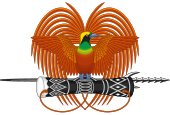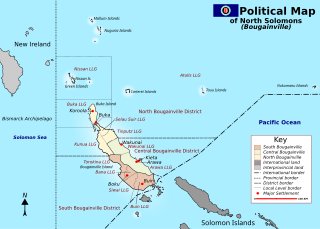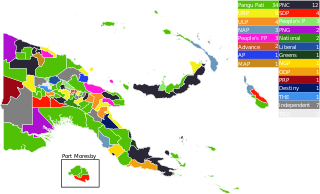| | |||||||||||||||||||||||||||||||||||||||||||||||||||||||||||||||||||||||||||||||||
| |||||||||||||||||||||||||||||||||||||||||||||||||||||||||||||||||||||||||||||||||
All 124 seats in the National Parliament 63 seats needed for a majority | |||||||||||||||||||||||||||||||||||||||||||||||||||||||||||||||||||||||||||||||||
| |||||||||||||||||||||||||||||||||||||||||||||||||||||||||||||||||||||||||||||||||
 |
|---|
General elections will be held in Papua New Guinea at some point in or before 2027 to elect members of the National Parliament. [1]
| | |||||||||||||||||||||||||||||||||||||||||||||||||||||||||||||||||||||||||||||||||
| |||||||||||||||||||||||||||||||||||||||||||||||||||||||||||||||||||||||||||||||||
All 124 seats in the National Parliament 63 seats needed for a majority | |||||||||||||||||||||||||||||||||||||||||||||||||||||||||||||||||||||||||||||||||
| |||||||||||||||||||||||||||||||||||||||||||||||||||||||||||||||||||||||||||||||||
 |
|---|
General elections will be held in Papua New Guinea at some point in or before 2027 to elect members of the National Parliament. [1]
At the previous elections in 2022 the Pangu Pati, led by James Marape, won 39 seats, gaining 30 seats, in a landslide victory. However, no party won a majority of seats, which is common in Papua New Guinean elections.
The 124 members of the National Parliament are elected from single-member constituencies by limited instant-runoff voting; voters are given up to three preferences, with a candidate declared elected once they received over 50% of preference votes. [2] Of the 124 members, 102 are elected from "open" seats (increased from 96 in the 2022 elections), [1] with the remainder elected from "provincial" seats based on the twenty provinces, the Autonomous Region of Bougainville and the National Capital District. The winners of the provincial seats also become the provincial governor. [3]
Along with common key issues such as crime, employment and poverty, one specific issue for debate will be the status of the Autonomous Region of Bougainville, where 98% of the population voted for independence in a 2019 referendum. Bougainville is expected to achieve independence by 2027 if an agreement is ratified by the National Parliament. [4]

Papua New Guinea is a country in Oceania that comprises the eastern half of the island of New Guinea and its offshore islands in Melanesia. Officially the Independent State of Papua New Guinea, it shares its only land border with Indonesia to the west and it is directly adjacent to Australia to the south and the Solomon Islands to the east. Its capital, located along its southeastern coast, is Port Moresby. The country is the world's third largest island country, with an area of 462,840 km2 (178,700 sq mi).

The politics of Papua New Guinea takes place in a framework of a parliamentary representative democratic multi-party system, whereby the prime minister is the head of government. Papua New Guinea is an independent Commonwealth realm, with the monarch serving as head of state and a governor-general, nominated by the National Parliament, serving as their representative. Executive power is exercised by the government. Legislative power is vested in both the government and parliament.

Bougainville, officially the Autonomous Region of Bougainville, is an autonomous region in Papua New Guinea. The largest island is Bougainville Island, while the region also includes Buka Island and a number of outlying islands and atolls. The current capital is Buka, situated on Buka Island.

Sir Julius Chan is a Papua New Guinean politician who served as Prime Minister of Papua New Guinea from 1980 to 1982 and from 1994 to 1997. He is Member of Parliament for New Ireland Province, having won the seat in the 2007 national election. He is also the current Governor of New Ireland Province, since 2007. On 26 May 2019, Prime Minister Peter O'Neill announced he would soon resign and that he wished for Sir Julius to succeed him. An outgoing Prime Minister does not, however, have the power to appoint his successor, and the following day O'Neill delayed his own formal resignation. He was also a leading figure in his country during the years-long Bougainville conflict.

For administrative purposes, Papua New Guinea is divided into administrative divisions called provinces. There are 22 provincial-level divisions, which include 20 provinces, the Autonomous Region of Bougainville, and the National Capital District of Port Moresby.

Bougainville, an autonomous region of Papua New Guinea (PNG), has been inhabited by humans for at least 29,000 years, according to artefacts found in Kilu Cave on Buka Island. The region is named after Bougainville Island, the largest island of the Solomon Islands archipelago, but also contains a number of smaller islands.

Papua New Guinea elects on the national level a legislature. The National Parliament has 111 members, elected for a five-year term in single-seat constituencies. Papua New Guinea has a multi-party system, with numerous parties in which no one party often has a chance of gaining power alone, and parties must work with each other to form coalition governments. The first-past-the-post voting system was previously used, but in 2002 the limited instant-runoff voting system was enacted into law and first used during the 2007 national election and 2008 local elections.

The National Parliament of Papua New Guinea is the unicameral national legislature in Papua New Guinea. It was created in 1964 as the House of Assembly of Papua and New Guinea but gained its current name after the nation was granted independence in 1975.
Francis Ona was a Bougainville secessionist leader who led an uprising against the Government of Papua New Guinea as part of the Bougainville Civil War. He and his followers were concerned about the environmental and social effects of the operation of the Panguna mine by Bougainville Copper, a subsidiary of Rio Tinto Group. On 17 May 1990, Ona declared the independence of the Republic of Me'ekamui. It was not recognised internationally. In May 2004 Ona proclaimed himself "King of Me'ekamui." While resisting the peace process and 2005 elections, Ona mostly stayed in a safe haven, where his BRA forces controlled territory. He died of malaria in his village.

Sir Puka Temu,, is a Papua New Guinean politician. He has been a member of the National Parliament of Papua New Guinea since 2002, representing the electorate of Abau Open. A former Deputy Prime Minister under Michael Somare, he is part of Prime Minister James Marape's government as a member of the Our Development Party.

The Bougainvillean presidential election of 2010 was held in Bougainville, an autonomous region of Papua New Guinea. The presidential contest was part of the overall general election on the island. Voting began on May 7, 2010, and ended May 24, 2010. Final results for the election were announced on June 8, 2010.

John Momis is a Bougainvillean politician who served as the President of the Autonomous Region of Bougainville in Papua New Guinea between 2010 and 2020.

The Bougainville House of Representatives is the legislature of the Autonomous Region of Bougainville, an autonomous entity within Papua New Guinea. It was established in 2005 under Part 5 of the region's constitution, which specifies that the House of Representatives shall comprise 39 elected members in addition to the President of the Autonomous Region of Bougainville, and the Speaker of the House, chosen outside of it.

The Bougainville conflict, also known as the Bougainville Civil War, was a multi-layered armed conflict fought from 1988 to 1998 in the North Solomons Province of Papua New Guinea (PNG) between PNG and the secessionist forces of the Bougainville Revolutionary Army (BRA), and between the BRA and other armed groups on Bougainville. The conflict was described by Bougainvillean President John Momis as the largest conflict in Oceania since the end of World War II in 1945, with an estimated 15,000–20,000 Bougainvilleans dead, although lower estimates place the toll at around 1,000–2,000.

General elections were held in Papua New Guinea between 24 June and 8 July 2017. The writs for the election were issued on 20 April, and candidate nominations closed on 27 April.
Joe Lera was a Papua New Guinean politician from 2012 to 2020. He was a United Resources Party member of the National Parliament of Papua New Guinea, representing the Bougainville Regional seat. Although regional members generally assume the position of Governor, due to the existence of the devolved Autonomous Bougainville Government Lera was referred to as the "Regional Member for Bougainville". He was Minister for Bougainville Affairs in the government of Peter O'Neill.

A non-binding independence referendum was held in Bougainville, an autonomous region of Papua New Guinea, between 23 November and 7 December 2019. The referendum question was a choice between greater autonomy within Papua New Guinea and full independence; voters voted overwhelmingly (98.31%) for independence.

Francesca Rhianna Semoso is a politician and former broadcaster from the Autonomous Region of Bougainville. She has held the positions of Speaker and Deputy Speaker of the Bougainville House of Representatives; prior to her political career she was a radio broadcaster at the National Broadcasting Commission of Papua New Guinea. She is currently the MP for the North Bougainville Open, after winning a by-election in 2023.
Amanda Masono Getsi is a member of the House of Representatives in the Autonomous Region of Bougainville in Papua New Guinea (PNG).

General elections were held in Papua New Guinea from 4 to 22 July 2022 to elect the members of the National Parliament for a new five-year term.